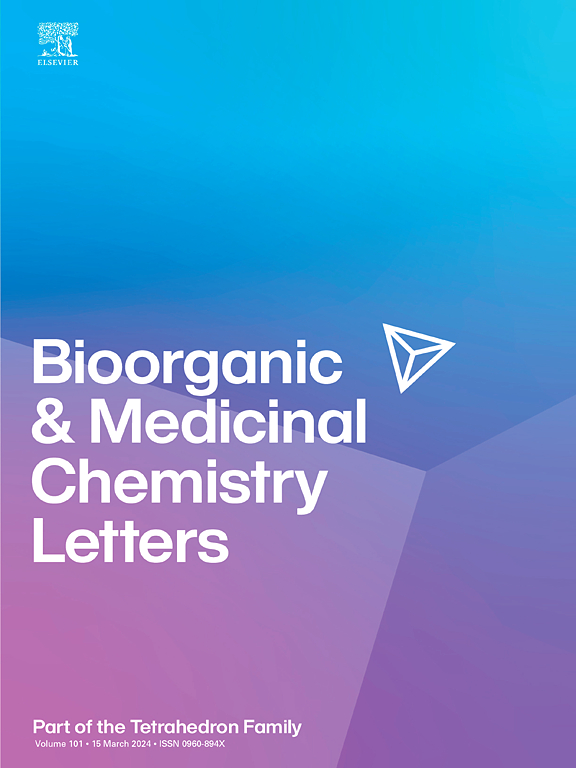Discovery of TNG-6132, a potent, selective, and orally bioavailable USP1 inhibitor
IF 2.5
4区 医学
Q3 CHEMISTRY, MEDICINAL
引用次数: 0
Abstract
USP1 (ubiquitin-specific peptidase 1) is a deubiquitinating enzyme that has been identified as essential in BRCA1/2 mutant cells and implicated in the DNA damage response. Inhibition of USP1 by small molecule inhibitors disrupts DNA repair and replication and is being pursued as a potential anticancer therapeutic in BRCA1/2 mutant cancers. We report the discovery of an in vitro and in vivo USP1 inhibitor tool compound TNG-6132 (18), a reversible, allosteric inhibitor of USP1, which strongly inhibits USP1 enzymatic activity. This inhibitory effect translates into in vitro cellular viability defects in a BRCA1-mutant breast cancer cell line, as well as an in vivo pharmacodynamic (PD) response and tumor growth suppression in a mouse xenograft efficacy model. Additionally, we report an X-ray co-crystal structure of TNG-6132 (18) bound in the USP1-UAF1 complex, a result that furthered our understanding of the role played by key elements of the pharmacophore of this chemotype as well as its mechanism of inhibition of USP1.

发现TNG-6132,一种有效的,选择性的,口服生物可利用的USP1抑制剂
USP1(泛素特异性肽酶1)是一种去泛素化酶,在BRCA1/2突变细胞中被认为是必需的,并与DNA损伤反应有关。通过小分子抑制剂抑制USP1破坏DNA修复和复制,这是一种潜在的抗BRCA1/2突变癌症治疗方法。我们报道了一种体外和体内USP1抑制剂工具化合物TNG-6132(18)的发现,这是一种可逆的USP1变构抑制剂,可以强烈抑制USP1的酶活性。这种抑制作用转化为brca1突变乳腺癌细胞系的体外细胞活力缺陷,以及小鼠异种移植疗效模型中的体内药效学(PD)反应和肿瘤生长抑制。此外,我们报道了与USP1- uaf1复合物结合的TNG-6132(18)的x射线共晶结构,这一结果进一步加深了我们对该化学型药效团关键元件的作用及其抑制USP1的机制的理解。
本文章由计算机程序翻译,如有差异,请以英文原文为准。
求助全文
约1分钟内获得全文
求助全文
来源期刊
CiteScore
5.70
自引率
3.70%
发文量
463
审稿时长
27 days
期刊介绍:
Bioorganic & Medicinal Chemistry Letters presents preliminary experimental or theoretical research results of outstanding significance and timeliness on all aspects of science at the interface of chemistry and biology and on major advances in drug design and development. The journal publishes articles in the form of communications reporting experimental or theoretical results of special interest, and strives to provide maximum dissemination to a large, international audience.

 求助内容:
求助内容: 应助结果提醒方式:
应助结果提醒方式:


